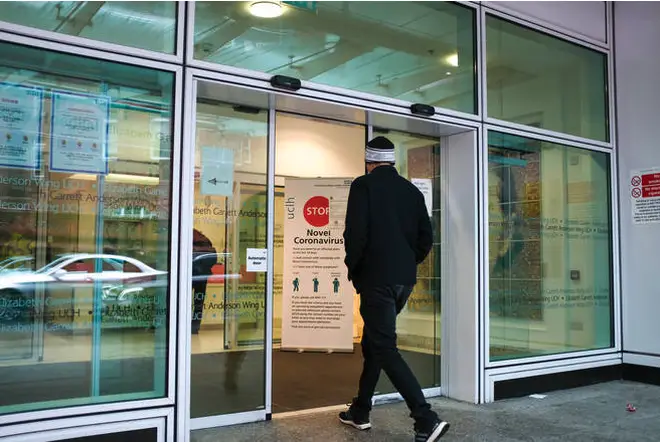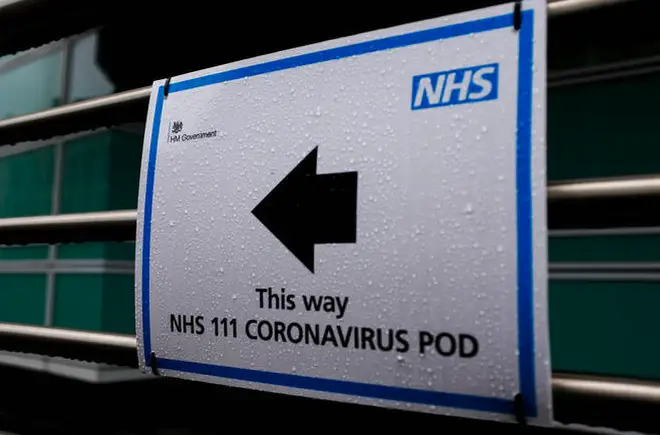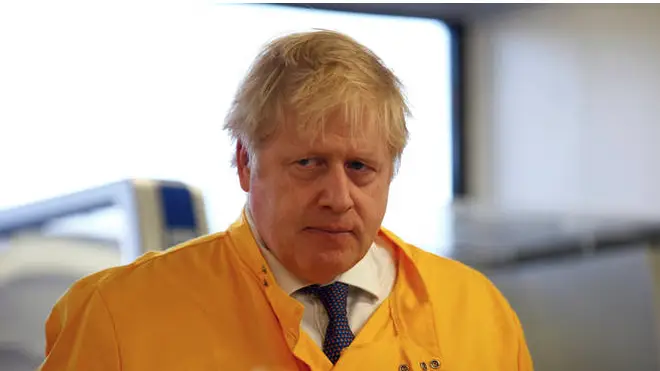
Nick Ferrari 7am - 10am
5 March 2020, 18:15 | Updated: 6 March 2020, 16:20

An elderly patient has become the first UK patient to die of coronavirus as cases surged above 100 for the first time.
In a statement, Royal Berkshire NHS Trust said:"Sadly, we can confirm that an older patient with underlying health conditions has died.
"The patient has previously been in and out of hospital for non-coronavirus reasons but on this occasion was admitted and last night tested positive for coronavirus."The family has been informed and our thoughts are with them at this difficult time.""We will not be commenting further and ask that everybody respects the family’s privacy."
The news came just hours after the Department of Health confirmed 116 people in the UK have tested positive for the disease.

Just two days ago there were 51 UK cases.
England's Chief Medical Officer, Professor Chris Whitty, said he was "very sorry" to report the news and offered "sincere condolences" to the family.
He added: "The patient, who was being treated at the Royal Berkshire Hospital, was an older patient who had underlying health conditions.
"We believe they contracted the virus in the UK and contact tracing is already underway."
Last week, the Foreign Office confirmed a British tourist who had been on board the Diamond Princess cruise ship, which was quarantined in Japan, had died from the virus.
Worldwide, 97,841 have been confirmed to have coronavirus, with over 3,300 dying from the disease.
The NHS has also called for anyone who has travelled to the UK from any part of Italy to self-isolate if they begin to show symptoms of Covid-19.
Thursday's update from the Department of Health came after England's chief medical officer warned critical care beds in the NHS could be put under intense pressure during an epidemic.
Prof Whitty told MPs the UK has now mainly moved into the "delay phase" of tackling the virus.
Half of all coronavirus cases in the UK are most likely to occur in just a three-week period, with 95% of them over a nine-week period, he added.
In a worst-case scenario, "the ratio of doctors to patients and nurses to patients would inevitably go down very sharply for a short period of time", Prof Whitty said, but he added the NHS is "incredibly good at flexing" to meet demands.
Prof Whitty said he had a "reasonably high degree of confidence" that 1% is at the "upper limit" of the mortality rate for coronavirus, although Wuhan in China, which has a weaker health system, had seen an 8% to 9% mortality rate for those aged 80 and over.
He said the UK has now mainly moved to the delay stage of tackling the virus, which could include measures such as school closures, encouraging greater home working, and reducing the number of large-scale gatherings.
However, Prof Whitty said closing schools would possibly only have a "marginal effect", adding that children do not appear to be as badly affected by Covid-19 as other groups.
But the Prime Minister appeared to contradict Prof Whitty, insisting the country was still in the contain stage.
He told reporters: "The situation is pretty much as it has been in the sense that we are still in the contain phase, though now our scientists and medical advisers are making preparations for the delay phase."
Prof Whitty said elderly people should not self-isolate yet, and neither should those with conditions such as asthma, adding there was no evidence of "deep harm" in children with asthma.
And he said pregnant women should not start worrying about coronavirus, but advised any smoker to stop.
Symptoms of Covid-19 appear around five days after infection, he said. It then takes up to a week to recover, with the serious illness setting in for some after six days.
Mr Johnson's battle plan to combat the spread of the virus includes asking workplaces to allow more staff to work from home.
The Times newspaper has reported plans are being drawn up that would mean the Commons and Lords not returning after Easter.
MPs rise on March 31 and sitting would be suspended until September in “the longest summer recess we have known”, one senior parliamentary source told the newspaper.
Read more: 'Brexit buffer' of medicines mean UK is 'well prepared' for coronavirus
The jump in confirmed cases comes as England's chief medical officer, Professor Chris Whitty, warned that a UK epidemic is looking "likely".
As we reported yesterday, the Prime Minister announced new sick pay changes as part of emergency coronavirus legislation so that anyone self-isolating is paid from day one rather than day four as current rules state.
Boris Johnson told MPs that people who self-isolate are "helping to protect all of us by slowing the spread of the virus".
He added: "If they stay at home and if we ask people to self-isolate, they may lose out financially.
Read more: Coronavirus: Beard sanitiser sales spike after NHS urged staff to shave
"So, I can today announce that the Health Secretary will bring forward, as part of our emergency coronavirus legislation, measures to allow the payment of statutory sick pay from the very first day you are sick instead of four days under the current rules, and I think that's the right way forward.
"Nobody should be penalised for doing the right thing."
Read more: Coronavirus UK: Do surgical face masks work to avoid virus symptoms?
Earlier, Prof Whitty told reporters there could be a need to do "extreme things" to protect the elderly and those with pre-existing health conditions.
He added: "At this point in time we think it is likely, not definite, that we will move into onward transmission and an epidemic here in the UK."

Read more: Coronavirus: What is a pandemic and how is one declared?
But he stressed that for most people, "this will be a mild or moderate disease, anything from a sniffle to having to go to bed for a few days, rather like with mild flu".
He said if the UK sees a very large epidemic, "then it will put very high pressure on the NHS", and there could be "several weeks which could be very difficult" for the health service and wider society.
Prof Whitty suggested that shutting down cities in the UK would not be effective now.
He said: "Closing cities is really only appropriate if you have a significant epidemic in one particular place and almost nothing anywhere else.
"It made sense for China to respond in the way it did but it would be very unlikely here ... This is now in multiple places in Europe and around the world."
Read more: ‘Don’t die, please buy’ Glasgow newsagent sells out entire stock of coronavirus face masks
A letter to NHS trusts has also been published telling them to ramp up their plans for tackling Covid-19, including seeing patients via video-link.
It sets out that a level 4 NHS incident has been declared - the highest level - meaning extra steps are needed.
Former business secretary Andrea Leadsom said preparations for a no-deal Brexit had aided the Government's response to the coronavirus outbreak.
She told Sky News: "Ironically, I think a lot of the work we did last year preparing for the supposed no-deal Brexit on 31 October has stood the Government in incredibly good stead - looking at packages of support and how you might be able to help companies keep going should something dramatic happen.
"I'm quite sure that some of that will be being dusted off with a view to looking at how that could be adapted."
Read more: Brighton shop owner asks customers to wear masks and gloves amid coronavirus fear
A new Government publicity campaign seeks to drive home the message that regular hand-washing is the single most important action individuals can take in the fight against Covid-19.
The new adverts say hand-washing should be for 20 seconds, using soap and water or hand sanitiser.
Government scientific experts predict the UK's coronavirus outbreak could last around four to six months.